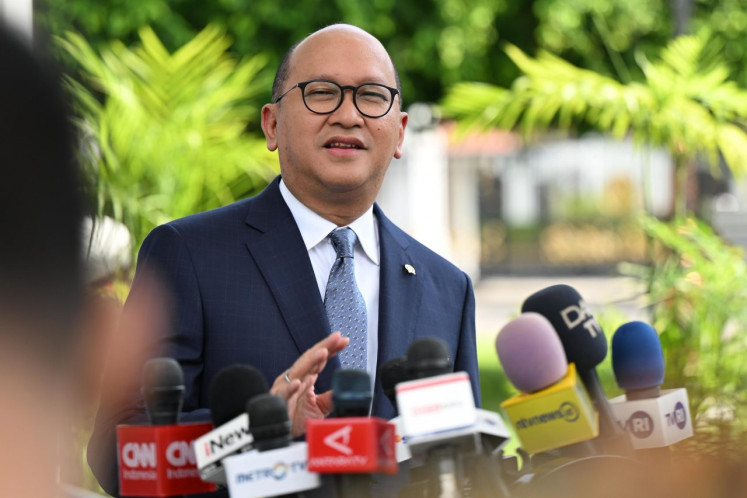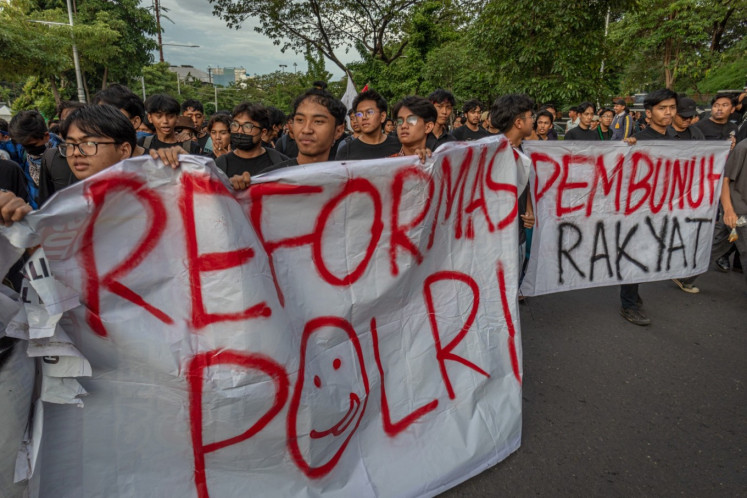Popular Reads
Top Results
Can't find what you're looking for?
View all search resultsPopular Reads
Top Results
Can't find what you're looking for?
View all search resultsRekin, Rafako team up for Lombok power plant project
New agreement: Gema Group representative Rudy Poespoprodjo (front, right) and Rafako-PBG representative Grzegorz Kiczor (front, left) sign a partnership agreement on June 9 in Warsaw, Poland
Change text size
Gift Premium Articles
to Anyone
N
span class="caption">New agreement: Gema Group representative Rudy Poespoprodjo (front, right) and Rafako-PBG representative Grzegorz Kiczor (front, left) sign a partnership agreement on June 9 in Warsaw, Poland. The signing ceremony was also attended (rear, left to right) by Indonesian Ambassador to Poland Peter F. Gontha, Coordinating Maritime Affairs Minister Luhut B. Pandjaitan, Polish Maritime and Inland Navigation Minister Marek Gróbarczyk and Indonesian lawmaker Fadel Muhammad.(Courtesy of Indonesian Embassy in Poland)
State-owned construction company PT Rekayasa Industri (Rekin) is teaming up with a Polish company to build a 2 x 50 megawatt (MW) power plant for state electricity firm PLN on Lombok, West Nusa Tenggara, following its success in securing the tender for the project.
The official signing of the strategic partnership took place last Friday in the Polish city of Szczecin, witnessed by Indonesia’s Coordinating Maritime Affairs Minister Luhut Pandjaitan and Poland’s Maritime and Inland Navigation Minister Marek Gróbarczyk.
The partnership between Rekin and Rafako, an engineering, procurement and construction contractor focused on the power-generation industry, is expected to give a competitive edge to the development of power plants in Indonesia, the companies said in a joint press release on Tuesday.
Rafako president and CEO Agnieszka Wasilewska, meanwhile, pledged that the company would help empower the Indonesian construction industry with guaranteed orders for parts and supplies.
“We have long felt that our experience and partnership with Rekin will give us more opportunities to participate in the development of Indonesian infrastructure at a competitive price, with European Union technical standards, not only in conventional power-generation technologies but also in the area of other new, environmentally friendly technologies,” she said in the press release.
Rafako, part of PBG Group, was established in 1949 and employs around 2,000 people. It is one of the biggest boiler producers in Europe. Some 80 percent of boilers operated by Polish utilities have been delivered by Rafako.
Indonesia is currently attempting to develop the capacity to generate an additional 35,000 MW of electricity in the country, in the hope of boosting the national electrification ratio to 97 percent by 2019, as well as to meet the continuously increasing demand for electricity from household customers and industry players.
Both the Energy and Mineral Resources Ministry and PLN, however, have predicted that with the program’s current progress and the country’s economic growth, only around 20,000 to 22,000 MW is likely to be procured by 2019.
However, the government has decided to maintain the target in the General Plan for National Energy (RUEN), which has reportedly been signed by President Joko “Jokowi” Widodo in the form of a presidential regulation.
The RUEN stipulates that 114,000 MW will be procured by 2025, comprising the 35,000 MW megaproject and the fast-track program I and II, both of which were left over from former president Susilo Bambang Yudhoyono’s administration.
The 35,000 MW project is basically a continuation of the 10,000 MW policy launched by Yudhoyono during his tenure in 2005 in order to maintain reserve margins — the difference between capacity and demand — with the International Energy Agency’s recommended level of 20 to 35 percent.
As the nation is at risk of a power crisis should the level decline to below 20 percent, Jokowi, who was inaugurated as the country’s seventh president on Oct. 20, 2014, took the initiative to boost power capacity to spur economic growth. (hwa)










